Bread sales are coming out of the doldrums, but retailers need to ensure that their bakery aisle meets demand for fresh tastes
Today’s bakery category isn’t an easy one for retailers. On the one hand are the so-called experts urging us to steer clear of starchy foods to live a healthy life, on the other TV cookery gurus tempting us with rustic and artisan breads to reignite our love of the loaf.
For Conrad Davies, owner of four Spar stores in Wales, The Great British Bake Off effect may have the upper hand. “I think the Bake Off shows have helped the younger generation to get into baking. In Wales, traditionally, people like to bake, but the programmes have renewed people’s interest in the bakery category,” he says,
Matthew Grenter, sales manager for Brioche Pasquier, believes the many messages do make it hard for retailers to decide what to stock. He says: “Our current bakery choices have been influenced by many factors – our desire to lead a healthier life, TV baking programmes, our ability to travel, immigration. All of these influences make stocking a bakery section very difficult for convenience stores who are trying to offer variety and yet must make the right choices so that products are not left to go stale on the shelves.”
The good news is that after years of decline, the bread category is showing the early signs of recovery. Sales are increasing for the first time in more than three years, with value sales up 0.3% in the past year and 1.3% in the latest quarter (Nielsen ScanTrak data 52 w/e to 4 November 2017).
Hovis puts the success down in part to the move away from a single grocery shop towards top-up shopping.
Martin Baptie, category controller for Warburtons, agrees. He says: “Throughout grocery there is evidence of an increase in unplanned shopping behaviour as ‘little and often’ becomes more prevalent. Bakery can provide solutions to this through ranges that satisfy top-up missions on the one hand, while offering tasty treats on the other.”
Jag Brar, owner of Londis in Cricklade, Wiltshire, has noticed the shift in shopper habits in his store. “We’ve found that people tend to buy bread on a daily basis. Whereas before they would buy it from the supermarkets, now they come to us for convenience and buy bread and milk as often as they want.”
He says that people are still loyal to the brands, but more of them are opting for healthier loaves such as those from Allied Bakery, which are more artisan. “There is definitely an element of people wanting to eat healthier, rather than buying regular white and brown bread.”
Jag sells a lot of freshly-made bread baked in his in-store bakery as well as wrapped bread in smaller packs. “Most customers are elderly so would prefer to buy what they can manage, rather than waste it,” he points out.
Get Toastie with Warburtons
Warburtons has added a wholemeal variety to its range of Toastie loaves. The loaf offers consumers a ‘fuller flavour’ in a tin format, and guarantees consumers a uniformed slice of toast.
The brand believes npd continues to be an exciting area of growth for bread, attracting new shoppers to the bakery category.
Darren Littler, innovation and product marketing director for Warburtons, says: ‘’As bakery innovators with more than 140 years’ experience, we are continually looking for ways to expand on our best-selling ranges.
“That’s why we’re delighted to launch the new 800g Wholemeal Toastie Loaf, which offers consumers a new way to enjoy our much-loved Toastie loaf in an even fuller flavour. The loaf is soft but strong, which means that it’s perfect for buttering and a great way to enjoy the perfect slice of toast.”
Last year Warburtons launched its Toastie Pockets range, designed to capitalise on the opportunity for snacking and lighter meal occasions.
Toastie Pockets are ready-made bread pockets and provide a quick and easy sandwich option for time-poor consumers. All shoppers need to do is add their filling of choice and pop them in the toaster.
The Toastie range will be a key area of focus for Warburtons this year. The brand will also continue to support its Protein range, following the launch of its Seeded Protein Thin Bagels. The new range provides 8g per bagel and fibre (rrp £1.40 for a four- pack).
Changing demands
Hovis has been reacting to changing demands, says Sara Green, head of insight, with npd that satisfies those looking to avoid waste and those looking to cut carbs. “Half Loaf and Lower Carb have been launched in direct response to changing consumer needs, meeting the requirements of smaller households and those seeking to enjoy a balanced and varied diet,” she says.
Jag believes that while customers are looking for something different in the bakery category, his aren’t quite ready to go full-on gluten-free just yet. “If customers request something we try to get it in for them. That being said, we have to prioritise the best-selling products, especially with bread which has a very limited shelf life. It’s a fine line to balance.”
Hannah Morter, marketing executive at Country Choice, points out that demand for healthy items is dictated by customer demographics.
She says: “Retailers certainly need to be aware of the growing trend towards healthier alternatives such as gluten-free, wholemeal and soya loaves. However, we believe that understanding their customer base is key and so while some shoppers will be looking for truly healthier options, others are looking for products that fit a range of other dietary or lifestyle demands including artisan-inspired loaves, premium options or free-from alternatives.”
She points out that having a good understanding of your customers’ needs is the best way for retailers to decide upon their range. “Retailers should, in general, continue to stock the core essentials such as French breads (demi baguettes, Parisiennes), rolls and bloomers, but consider including some alternatives such as sour dough or ancient grain substitutes.”
Conrad has noticed more people asking about gluten-free bakery products. “It’s nothing amazingly different,” he admits, “but we do sell more volume than a few years ago. In our bigger store in Y Maes, Pwllheli, we have a whole section dedicated to gluten-free products and about 30 lines in all. We have the luxury of enough space in store to dedicate to the section.”
However, Conrad’s customers are just as keen to pick up traditional sliced bread. “Our best-selling brand is Village Bakery. It’s Welsh, but I think it sells well because of the quality rather than just being a local product. The sough dough and rye varieties also do really well.
“We are lucky that in two of our stores we also have a large bakery that makes fresh products all day long. I think that really makes a difference to sales with the smell of fresh bread floating through the store; it’s a killer!”
According to Paul Whitely, head of UK marketing at Aryzta Food Solutions, offering freshly-baked products can attract new shoppers and increase basket spend. He says: “In convenience, in-store bakery shoppers spend more than average shoppers and shop more frequently. The reality is that, on average, an in-store bakery can generate an extra £51.04 per shopper per month (HIM, 2017).
“We have a variety of options for retailers, from purchasing ovens and equipment, right through to schemes whereby retailers who work with us and meet the appropriate level of sales can loan equipment from us through a partnership agreement.”
Aryzta Food Solutions offers a mix of savoury and sweet bakery products that are designed to appeal to the take-home and on-the-go markets.
Conrad has a strong food-to-go range so sweet pastries and bakery snacks are popular among his customers, but the trend towards ‘dirty’ food is having the biggest effect on his bakery sales.
“Brioche buns do so well in our store, because people are looking for a more premium bread to have with dirty meals such as burgers, ribs or chicken wings,” Conrad explains. “It’s the dirty revolution that is helping us. People especially like to buy those kinds of meats from our stores so often pick up the buns at the same time. In the summer, when the BBQ season is in full swing, our bakery sales are really going to hit a new high!”
Going gluten-free
Gluten-free products performed particularly well in 2017 and the category is set to grow even further in the year ahead, according to Mintel.
It reports that one in 10 people now avoid gluten altogether, with more people choosing to avoid it for health benefits, rather than as a dietary requirement (Mintel, December 2017).
Some 15% of households are now avoiding both gluten and wheat. More than half of these households did so because they believed it was healthy, suggesting there is a real trend towards free-from products.
Sam Benjamin, brand manager for Too Good to be Gluten Free, expects this year to be huge for free-from brands, including those in the bakery aisle.
He says: “The free-from market is growing rapidly as last year alone the market cited a 27% rise in sales.
“This growth has been driven both by consumers who have medical conditions that require free-from diets, but also what we refer to as free-from lifestylers, a growing market of people who are choosing to cut certain ingredients from their diet for health, diet or lifestyle reasons.”
Benjamin adds: “This growing market is demanding free-from choices, but with the focus on the taste and quality of the product.
“We believe you can cut gluten completely without sacrificing on taste and it’s something that can be done with lots of food products.”
Benjamin adds that as a result of demand Too Good to be Gluten Free is currently expanding its portfolio of pies, quiches, tarts and sausage rolls.
He adds: “At the moment we have a series of products in the snacking and sharing market and this is an area which we want to grow, to provide the consumer with a wider range to choose from.”
Merchandising
Grenter believes good merchandising in the bakery category is vital, as many bread products can be hard to display.
“Bread is notoriously difficult to display, being bulky and diverse in shape and size,” he says. “Our distinctive packaging can be stacked easily and yet because of the cheery blue and yellow colouring is still easy to pick out on the shelves.
“The blue and yellow diamond branding runs across all our products and allows customers the confidence of knowing that the same high standard of quality will be maintained throughout the range. We also offer incentives in the form of regular on-pack competitions which help to drive repeat sales.”
Gregory Cochrane, manager of Eurospar Binnian Fresh Food Hall in Kilkeel, County Down, employs a ‘bread champion’ to ensure the section looks good at all times and maintain standards, and the use of planograms in the section has allowed the store to maximise range and space.
“Customer feedback has been very positive as the section has become a lot easier to shop as ranges are grouped together by type rather than by supplier. With our bakery section accounting for 11% participation within the store, it is key this area gets the focus it requires,” says Gregory.
The re-worked range allows Gregory to keep a close eye on what’s selling and what’s not. “By dedicating space to each product we can quickly see what lines are selling out early and ensure we communicate this to the supplier to increase availability and look at further orders going forward,” he explains.
“Another major benefit has been the freeing up of space due to duplication within the category and this has allowed us to introduce 15% more products.”
As a result, the store has enjoyed excellent sales from new additions such as raspberry & white chocolate scones, multi-seed GI loaf and chia bread, and an extended naan bread range. The store’s wrap and part-baked range has also performed strongly, especially during busy lunchtimes.
Local lines feature, too. “With the store focus on supporting local suppliers, we wanted to create an area within the bread fixture for our local bakery, Corn Dolly. We branded the area Corn Dolly with photos of the owners and created a real local feel around the brand,” Gregory says.
Tittensor believes retailers can increase bakery sales in their store by following some simple steps. He says: “Brands continue to play a key role in a store’s sales (Nielsen, Total Coverage, Unit Sales, 52 w/e 30 December 2017), so it pays to make sure there is good availability on key lines and that these are clearly signposted, in order to drive both traffic and spend.
“To maintain the freshness of bread and bakery products, retailers should keep these away from cold or chilly areas and instead display them in a place where the temperature is about 220C/720F.
“Store owners or managers should also consider using POS and in-store theatre to maximise seasonal occasions where wrapped bakery products play a key role – such as sliced bread for breakfast and rolls for picnics and BBQs during the summer.”
Whitely at Aryzta Food Solutions recommends taking note of demand during different parts of the day. He says: “With many people now skipping the traditional breakfast at home, and with the continued rise of coffee, there’s a key opportunity for retailers to implement a link purchase such as a coffee with a croissant or pain au chocolat, for example, to maximise the breakfast-to-go occasion.
“From 2pm onwards, we know that the traditional food to go and drink-to-go missions begin to slow, however the treat mission continues to hold up as shoppers look to treat themselves during the afternoon and early evenings.”
Samantha Winsor, assistant brand manager at Lantmännen Unibake UK, believes sales of bakery items are often helped by food-to-go missions. “Placing freshly-baked pastries at the front of store and alongside coffee machines can help increase sales,” she points out.
“Offering customers a taster of key products is an effective way to show off their quality and taste credentials, and using strong POS material is an effective way to promote the quality of the range and communicate usage ideas such as ‘great with coffee’, ‘a breakfast treat’, ‘this week’s special’, or ‘freshly baked’.”
Kingsmill invests in npd and TV push
This month Kingsmill concludes a four-week run of TV ads to support its 50/50 loaf.
The advert has been designed to celebrate the role that bread plays in the everyday lives of families across the UK.
The new creative explores the positive moments of contemporary family life with the slogan ‘Loaf’s Good’.
Matthew Cullum, head of marketing at Allied Bakeries, says: ”There is clear space in the bread category for Kingsmill to be the more outward-looking brand; we’re the only bread brand celebrating the families who make us part of their lives and we’re proud of the role our products play.
“Our new slogan, ‘Loaf’s Good’, embodies a positive outlook on life and enhances the idea that it’s the simple pleasures in life that matter.”
Kingsmill has invested £1.5m in the campaign and the new ad is also available to view through online video services.
The brand has also launched a Super Seeds loaf, offering families a new everyday sliced bread option.
Available in 800g and 400g varieties (rrp £1.25 and 75p respectively), the new loaf contains linseed, sunflower, poppy and pumpkin seeds.
The new high-fibre range is available to independent retailers now.
















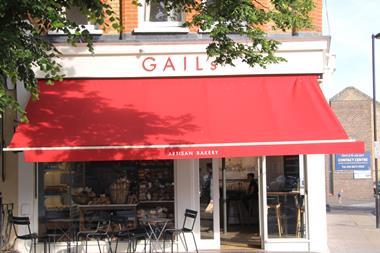
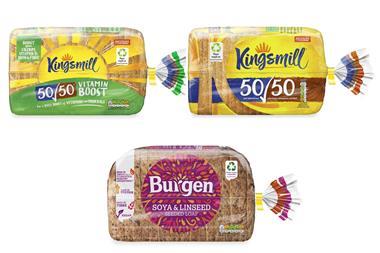
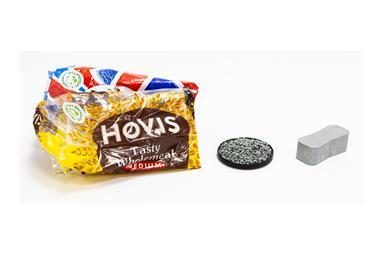
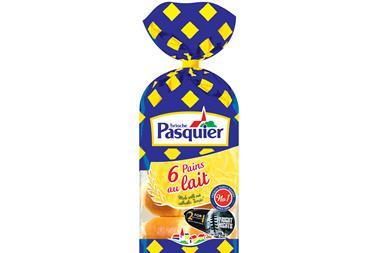
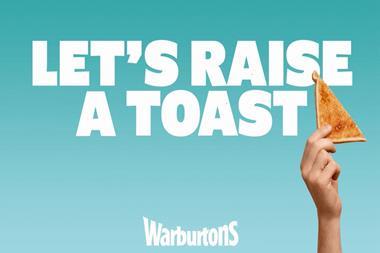
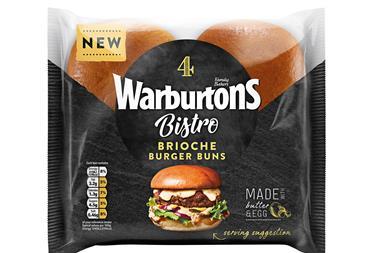






No comments yet